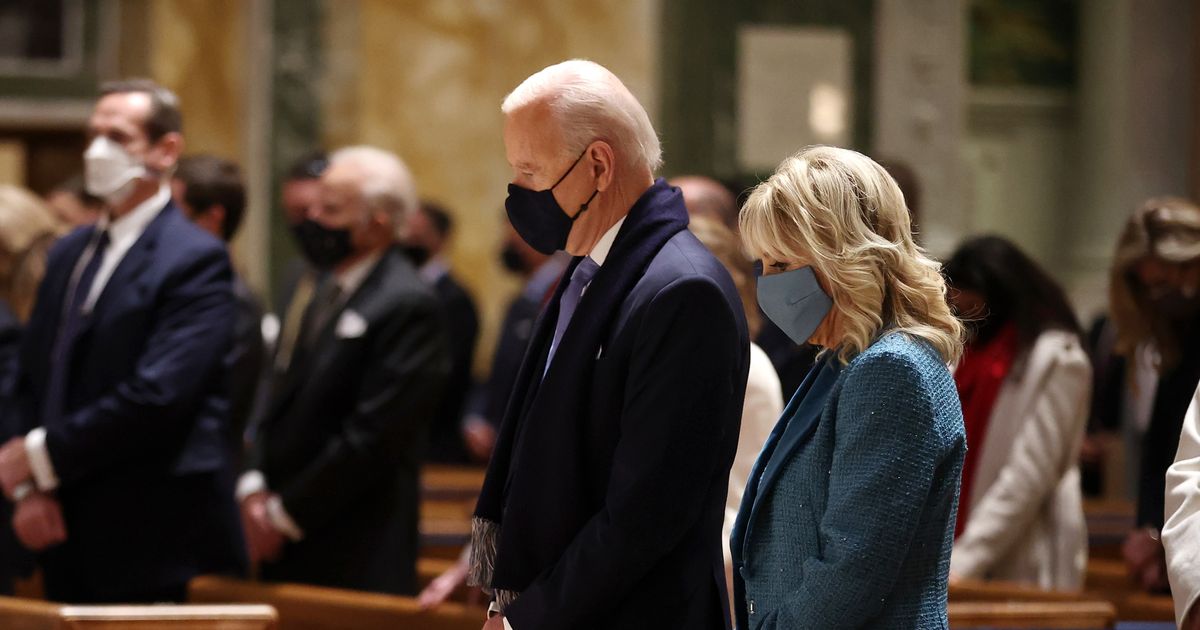[ad_1]
Will Joe and Jill soon be turned back to the altar?
Photo: Chip Somodevilla / Getty Images
Joe Biden is the second Roman Catholic to become president, winning the White House 60 years after John F. Kennedy. It is also arguably the most religious president (as measured by regular church attendance) since Jimmy Carter.
It is therefore somewhat shocking that the United States Conference of Catholic Bishops, acting against the public and private advice of the Vatican, has made a decision deliberate step during its spring meeting to draft and promulgate a “document on the Eucharist†which some supporters claimed was intended to deny communion to the president and other prominent pro-choice Catholic politicians. The vote, after a brief but intense debate, was 168-55, with six abstentions. The margin is important because the adoption of the declaration that the bishops are considering (possibly for publication as early as November) would require a two-thirds vote. It would also require a prior Vatican review, which could also slow or even stop the condemnation action.
Barring something truly unprecedented, however, the ultimate decision to allow or deny communion to Biden and other politicians based on their public policy positions on abortion (or other matters like same-sex marriage) would belong to individual bishops, and in some cases to individual priests. The two most relevant bishops to the Biden family, in Washington, DC, and Wilmington, Delaware, are not part of the aggressively conservative camp of those pushing for a “declaration” clarifying the obligation of communicants (especially those who hold high-profile public office) to support church teachings. But the president can’t be at home in the White House or Delaware every Sunday, so a landscape of hostile bishops or priests (like the parish priest who refused Biden’s communion in South Carolina in 2019) would be inconvenient, even problematic.
Perhaps the conservative episcopal decision against Biden was simply designed to raise the stakes of a more general cultural war against the “liberals,” against the Democrats, or even against Pope Francis, who is resolute in his views on the abortion but is especially friendly towards Biden. Some of the same American bishops who want to sanction or intimidate Biden have been part of religiopolitical resistance to Francis’ decidedly non-traditional views on climate change, poverty, and the relative importance of social and cultural issues. Indeed, the New York Times seen the vote on a “declaration” as a power movement by a Catholic “conservative movement” which is in almost open revolt against the Vatican:
It was the most dramatic example of the reach of the conservative Catholic movement since Mr. Biden was elected. But the contingent had grown stronger throughout the Trump era, clashing with the Vatican, wresting the influence of Pope Francis’ main representatives in the United States and further polarizing faithful Catholics in the process …
Pope Francis’ main American allies, including Cardinal Blase Cupich of Chicago, Cardinal Joseph W. Tobin of Newark, and Cardinal Wilton Gregory of Washington, have sided with Vatican warning against the continuation of the Eucharistic document, but they were eventually drowned.
The decision to go ahead with the declaration may also have reflected some of the enthusiasm of the anti-abortion movement (in which conservative Catholics have cooperated closely with conservative evangelicals) over the possibility that the State Supreme Court -Unis cancels Roe deer v. Wade in his next term and bring the abortion policy back to legislative determinations (and therefore to partisan politics on a daily basis).
Both sides in this dispute are careful to present their views as consistent with traditional Catholic reverence for Communion (or the Holy Eucharist as it is more formally called, a sacrament of the Church at the heart of Mass), conservatives claiming that obedience to key Church teachings is part of “Worthy of communion”, while their opponents warn against “The arming of the Eucharist†for political ends. This argument may seem odd to Protestants, who on the whole do not limit access to communion to members of their own faiths, and are generally less afraid of profaning the ceremony with unworthy communicants. But the intra-Catholic argument reflects broader tensions over Church-State relations and religious-secular cooperation, with one key difference: Thanks to the emphasis Catholics place on regular Mass attendance, it is not. not easy for Biden to imitate his predecessors like Ronald Reagan and George W. Bush by professing his personal piety without going to church often.
So far, neither Francis nor his friend in the White House have publicly commented on the bishops’ implicit threats. Like Jason Horowitz Noted, the Pope’s silence may simply reflect differences with the American hierarchy that are only part of the picture: The Pope’s silence also underscored how little surprise the US vote, released on Friday, was to the Vatican. “
The most fundamental question is how the lay Catholics regular in the pews will react to this struggle. American Catholics routinely disregard Church teachings on contraception and, according to all available evidence, are as likely to promote legalized abortion and same-sex marriage (not to mention divorce and remarriage and full equality of women in the clergy) as other Americans. Conservative bishops are choosing a fight they risk losing not only in the context of global Catholicism, but in their own parishes.
[ad_2]

